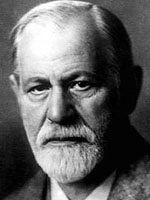Interesting facts
The Researcher (The Black (Grey) Jupiter)
Perhaps, Freud devoted his whole life to one or another way of studying and research. He began with the "biological" foundation of human nature, and switched to "psychical" later, but Freud had always been learning something, and then published the works, which taught other people. Freud dedicated university and the next few years to the studies in the field of applied biology. He conducted a research on the brain of animals and human embryos and made several important observations, which contributed to the foundation of neural theory – the basic principle of modern neuroscience. Freud also thoroughly mastered the methods of diagnosis and treatment of children with brain damage, as well as a variety of speech disorders. His publications on this become well known in the scientific and medical community. Freud gained a reputation of a highly qualified neurologist. Then he mastered the hypnosis, and switched to mental problems of the patients.
The guesses, observations and discoveries (The Black Mars)
Having abandoned the hypnosis, Freud used the method of free associations. The patient, who was fully conscious, told the analyst everything he had in his head, not hiding a single thought. He even said things which seemed quite pointless to him, and even the facts, he was ashamed or uncomfortable to talk about. By collecting this material, Freud made the observation, which played a significant role in shaping his psychoanalytic concept. He found out that flawed memories occur to patients in the process of presentation of the disease history. These were the violation of causality of events, forgetting the facts and temporal relations. Freud concluded that amnesia was a result of the so-called displacement. This is a kind of psychological protection against the treatment, and the thoughts which come to mind are the reflection of the unconscious movements of the soul. The unconscious, according to Freud is the unrealized desire, which due to the requirements of generally accepted norms were not allowed to have access to the consciousness and were displaced. According to the scientist, it is revealed in slips of the tongue, associations and dreams. Thus, he believed that it was not necessary to immerse a person in a hypnotic state to penetrate into the unconscious. It was needed to use his associations skillfully, and patient’s awareness of his unconscious flows as a result of such treatment gave opportunity to find a way out of internal, unrealized, "stuck" energy and achieve emotional relief.
From the individual to the typical (The Black (Grey) Mars, The White Mercury)
Having a practice of the psychotherapist, Freud went from individual to social behavior. He was looking for the expression of the complexes, sexual instincts and perverse ways of satisfying them in the monuments of culture (myths, customs, art, literature, etc.). Following the trend of biological function of the human psyche, Freud extended so-called biogenetic law on the explanation of its development. Following this law, Freud stated that the core of the unconscious psyche is formed from the ancient heritage of the mankind. The unbridled instincts of our wild ancestors appear in our fantasies and instincts. Freud did not have any objective data speaking in favor of this scheme. It was purely conceptual and "speculative" theory. Freud hoped that by taking knowledge about sexual complexes not from the reactions of his patients but from the cultural monuments, his schemes would become universal and credible. His appeal to the data concerning the psyche of "the primitive people" and "savages" (Freud relied on literature in anthropology), was aimed to show the similarities between their thinking and behavior and symptoms of neurosis. Thinking "by analogy" allowed Freud to spread his theory nearly on everything, as if there were no boundaries of its application, and as if there were no boundaries between a person and an animal.
The Perseverance (The White Saturn, The Black Sun)
Nuremberg hosted the first international congress on psychoanalysis in 1910. However, there started to appear conflicts in this community, which announced psychoanalysis a special science, different from psychology. This led to its collapse. Many of Freud’s former closest associates left him and set up their own schools. There also were such researchers as Alfred Adler and Carl Jung, who became major psychologists later among them. The majority left Freud because of his commitment to the principle of the omnipotence of the sexual instinct. The facts of psychotherapy and its theoretical understanding spoke against this dogma. Freud himself had to make adjustments in his scheme soon as the life forced him. World War I broke out. There were military doctors familiar with the methods of psychoanalysis. Their patients suffered from neurosis caused not by the sexual experiences, but by the hardships of the wartime trials. Freud also faced these patients. His former concept of dreams of neurotic character, which arose under the influence of the treatment of the Viennese bourgeoisie at the end of the XIX century, was useless to interpret the mental traumas of former soldiers and officers caused in battles. The fixation of new Freud's patients on these injuries caused by meeting with death gave him a reason to put the version about a particular attraction, as mighty as sexual forward. It provoked the painful fixation on events, associated with fear, causing anxiety etc. Freud named this particular instinct, standing along with sexual in the foundation of all forms of behavior, by ancient Greek term Thanatos. Thus, Freud "finished constructing" his theoretical building, but he did not move away from the basic principles of his theory.
The Dependence (The Black Moon)
Initially, Freud’s interest in cocaine was medical. He tried it for the first time in 1884 and was impressed by its action: the use of the substance cured his depression and gave confidence. A young scholar wrote an article "On Coke" the same year. He strongly recommended the use of cocaine as a local anesthetic, as well as a cure for asthma, digestive disorders, depression, neurosis. The future father of psychoanalysis published a number of articles about the properties of cocaine. He described all the sensations caused by this substance in details. However, he wrote less enthusiastically about it in his later studies, because his close friend died of cocaine abuse. The scientist so sincerely believed in the "healing" properties of the white powder, which allegedly helped him to get rid of all of his fears and complexes that he became addicted to it. Freud was able to overcome the addiction, but it took a lot of effort and time.
The Love (The White Venus)
Freud met his future wife, Martha Bernays in April 1882 in Vienna. He had only one passion before this, certainly platonic. Perhaps, that is why the acquaintance with Martha had a great influence on him and gave him strength. They engaged in June of the same year. A year later, at the insistence of the bride's mother, who did not approve the choice of her daughter, the Bernays moved to Hamburg. Despite all the difficulties connected with different tiffs and impediments created by Martha’s mother and the financial situation, the young couple kept their love and maintained intense correspondence for several years. It virtually remained the only means of communication for the lovers for many years. Freud wrote daily, sometimes even two to three times per day. His letters contain such wealth autobiographical material, that it is possible to accurately reproduce the events that took place from 1882 to 1886. Moreover, they most fully disclose purely human Freud’s traits. His letters are distinguished with delicacy, thoroughness; often violently expressing his feelings, he describes the events of everyday life, his thoughts, actions, views reaching up to 12 pages of small handwriting (one of the letters was written on 22 pages). You can learn about the early days of his stay in Vienna, work, poverty, and hopes; about long conversations with friends in the clinic and in the café. Freud spoke about his love, his hopes and disappointments, about self-belief and doubts assailing him when he was starting to think about the future. He wrote about this to his beloved to bare the separation they both were overcoming.

